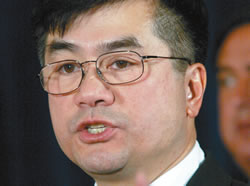NOW THAT GOV. Gary Locke has taken himself out of the governor’s race, a question remains: Can a real Democrat get elected?
Much has been made of the fact that there hasn’t been a Republican elected to the governor’s chair since John Spellman in 1980. In the wake of Locke’s Monday, July 21, announcement that he will not seek a third term, the head of the state GOP, Chris Vance, told The Associated Press that “the Democrats have had their chance, they’ve had 20 years, and they have made a mess of this state.”
That contention conveniently overlooks several important facts about said mess. One is that in recent years, the Legislature has been dominated by the GOP and the fear-driven gridlock generated by Attila-the-Eyman and his mercurial populist politics. The magician from Mukilteo successfully tapped into the “I’m-mad- as-hell” taxpayer zeitgeist and froze Locke and Olympia in their tracks.
Given the kind of leadership vacuum created by Locke’s detail-oriented style, legislative constipation, and terror of a taxpayer revolt, the bipartisan course in Olympia has been either to do nothing or to boldly find common ground by making the powerful happy, as exemplified by the recent $3 billion tax giveaway to Boeing.
IT COULD ALSO be said that Washington’s governors tend to defy easy categories. This is in part because some pothole problems aren’t very partisan by nature. It is also because the state is so diversefrom techies to cowboysthat governors have to be reasonably broad to serve well. But it is a modern hallmark that Washington’s governors are hard to pigeonhole.
Spellman, a former King County executive, was a Seattle Republican who ruled as a low-key moderate by current standards. (So low-key, in fact, there were parts of the state where he wasn’t recognized.) He followed the contentious academic Dixy Lee RayMadame Nuke, as Seattle Weekly called hera nominal Democrat whose main appeal to liberals was her gender. For all practical purposes, she was far to the right of her predecessor, Republican Dan Evans, our last three-term governor. It is hard to remember that the GOP ever had members as liberal as Evans. His first job after leaving the governor’s office was to serve as president of the Evergreen State College (Mossback’s alma mater, by the by), the state-funded hippie school that Ray once suggested be turned into a police academy. Booth Gardner, who followed Spellman, was a charismatic pro-business Democrat and a member of the Weyerhaeuser clan who managed in the middle and brought a fresh face to state politics. So unknown was he from his tenure as Pierce County exec that his first campaign slogan was “Booth Who?”
The last example of the true-blue Democratic liberal was Mike Lowry, whose ill-starred (or roving-hands) administration ended in part because of a sexual-harassment scandal and a tendency to be a little too eager to raise taxes.
LOCKE, AS I HAVE said in this column (see “The Locke Box,” June 25), has effectively switched parties in office. If the popular Evans ruled as a Democrat, the popular Locke governs as a mainstream Republican, especially when faced with the state’s most serious challenges. He has refused to raise taxes and has insisted that the only way to improve the state’s economy is to make it more big-business-friendly. Locke also has failed on his more progressive agenda, notably education. The state’s higher-ed system is in crisis, and the state’s schoolteachers had their voter-approved raises blithely scratched from the budget, thanks to the tax-averse Locke. The governor’s willingness to shred the social safety netjust at the time that net is neededhas made him unpopular with many of the core constituencies in his own party.
But not necessarily the broader electorate. When it comes to the governorship, Washingtonians don’t seem to reward stubborn ideologues, nor do they elect progressive visionaries. Locke has benefited from a highly regarded personal image, and his pro-business politics are widely approved of: Most people seem to think roads and Boeing giveaways are the right priorities. He also has benefited from a state Republican Party that has wandered too far into the right-wing wilderness. To combat this trend, the party now floats names for governor that often sound like private-sector variations on Locke himself: pro-business technocrats who might appeal to suburban women.
SO, IF THE GOP seeks to win by running a Locke clone, can the Democrats do better by running a real Democrat? Or are the parties doomed to meet in the middle and satisfy neither?
This is where it gets tough for the Democrats: to find a candidate who can manifest the mainstream solidity Locke represents, but also someone who actually hasand can articulatea vision that unites the haves and have-nots in an increasingly divided state. Where Locke found profound significance in legislative detail and deal making, the Democrats need a candidate who can inspire the citizenry, both as a problem solver and as someone who can show us that there is more to our future than a fast foot race to the bottom.
Locke’s decision not to run again is a first step in restoring a sense of possibility. It’ll be interesting to see if there’s someone out there who can seize the opportunity and run with it.







